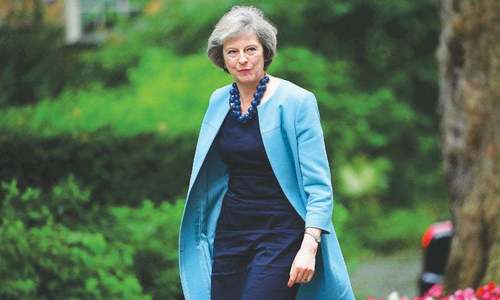The Brits can’t get no satisfaction. Prime Minister Theresa May is limping, victorious but wounded, out of a no-confidence vote that leaves the future of her Brexit plan as muddy as ever and not much to cheer about for partisans across the spectrum in the United Kingdom.
May won a year-long reprieve from another such challenge by surviving the vote, 200-117. But the surprising strength of the revolt from within her own party reflects the widespread antipathy at home to the deal she negotiated for the British withdrawal from the European Union.
And to hold off the rebellion, she pledged to step aside once a Brexit plan is approved. (“This must be the first time a premier has won a leadership challenge by turning herself into a lame duck,” the Financial Times' Robert Shrimsley writes. “She has paid a very high price for a pretty poor win.”)
The whole thing is pretty complex. Let’s break it down.
What’s next: May has until March 29 — 106 days — to win support for her lengthy plan aimed at providing an orderly exit from the European Union. It won’t be easy. “May and her Brexit plan have been pummelled for weeks by members of parliament, both from her own party and the opposition,” The Post’s William Booth, Karla Adam and Michael Birnbaum write. “Hardline Brexiteers want a cleaner break from the EU, while Remainers worry about the economic and other costs of what May has proposed.”
Both Brexit and Trumponomics prove that moving to withdraw from the global order as a shortcut to prosperity is a promise easier made than kept
And May’s critics from the left and right continued heaping disapproval on her in the wake of her putative win. Hardline Brexiteer Jacob Rees-Mogg called on her to resign; Labour leader Jeremy Corbyn said the vote revealed May’s “government is in chaos and she is unable to deliver a Brexit deal that works for the country and puts jobs and the economy first.”
Why it matters: A failure to secure an agreement could lead to a “no-deal Brexit”, in which the country crashes out of the European bloc with no grace period and no legal arrangements in place to smooth ongoing cross-border commerce. “A no-deal Brexit could bring chaos at ports, a freeze in trade, empty grocery store shelves, grounded aircraft and the threat of recession, economists have warned,” Booth and Co. write.
Bank of England Governor Mark Carney has estimated in the worst-case version of a no-deal Brexit, the British economy could shrink by eight per cent in a year, with property prices diving by a third.
May’s game plan: Via The New York Times: “Her strategy appears to be to delay the critical vote — now probably in the middle of January — and to hope that the growing risk of a disorderly departure brings some lawmakers back into line. But many doubt that will work.” May heads to Brussels today as part of a last-ditch effort to shore up the deal she spent 17 months negotiating.
The key flashpoint: The so-called Irish backstop, a piece of May’s plan guarding against the re-emergence of a physical border between Ireland, which is remaining in the EU, and Northern Ireland, which will still be part of the United Kingdom.
Both sides agree they don’t want to see the return of the checkpoints and patrols that once marked the dividing line on the island.
But the EU, which wants to ensure substandard goods aren’t snuck into its market from Northern Ireland, has proposed preserving the bloc’s rules there if the EU and UK fail to reach a long-term trade agreement. Critics say that would keep the UK under the EU’s thumb.
What’s really going on with the British right: The Post columnist Anne Applebaum breaks it down elegantly. “Any Brexit deal involves bad choices,” she writes. “Either Britain pays an economic price for losing access to markets, or — if Britain stays inside European customs arrangements without helping to set the rules — there is a price to be paid in influence.
With an eye on voters’ wallets, May chose the latter. And now — now! — after months of debate and thousands of hours of broadcast news and millions of words — most of the Brexiteers still will not accept their own responsibility for this outcome, the least bad of the bad outcomes on offer. They still do not want to admit that they misled the British people.
“They still pretend there is some better, alternate reality. And they are still jockeying for power. Instead of taking responsibility, they have blamed May — claiming, again falsely, that a different prime minister would get a different deal.”
The silver-lining scenario: Sebastian Mallaby, writing for The Post, sees a hard Brexit as unlikely in the event May can’t muster support for her plan. Instead, he writes, “Brexit will probably be postponed or put to a new vote. Britain might exercise its right to freeze the exit process and then never return to the negotiating table. Or it could freeze and hold a new referendum.”
The local angle: Candidate Trump recognised Brexit’s isolationism as kindred to his own #MAGA movement, taking its success as a harbinger for his bid and declaring himself “Mr Brexit”. The affinity runs deeper: both campaigns were covertly boosted by Russian operatives, raising questions about the hand that Russian President Vladimir Putin has played in sowing internal discord among western powers. (Indeed, congressional Democrats have probed whether Brexit leaders served as a conduit between the Kremlin and Trump’s operation.)
Trump’s own push to cut off the US economy from its traditional trading partners by raising new barriers has similarly unnerved business leaders and rattled stock markets around the world.
And both Brexit and Trumponomics prove moving to withdraw from the global order as a shortcut to prosperity is a promise easier made than kept.
Published in Dawn, The Business and Finance Weekly, December 17th, 2018















































